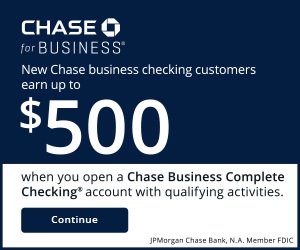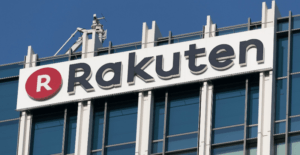
Are you considering opening up your own business one day? If so, you’re going to want to be organized and be able to keep the cash flows separate.
To get your business ventures more organized, there are five simple steps you have to take. In this post, we’re going to teach you How to Open a Business Bank Account, so that your business can be more organized!
| PROMOTIONAL LINK | OFFER | REVIEW |
| U.S. Bank Silver Business Checking Package | $900 Cash | Review |
| U.S. Bank Gold Business Checking Package | $900 Cash | Review |
| U.S. Bank Platinum Business Checking Package | $900 Cash | Review |
| Chase Business Complete Checking® | $300 or $500 Cash | Review |
| Huntington Bank Unlimited Plus Business Checking | $1,000 Cash | Review |
| Huntington Bank Unlimited Business Checking | $400 Cash | Review |
| Axos Bank Basic Business Checking | $400 Cash | Review |
| Axos Bank Business Interest Checking | $400 Cash | Review |
| Regions Bank Business Checking | $150 Cash | Review |
| NorthOne Business Checking | $20 Credit | Review |
| Novo Business Checking | $75 Cash | Review |
| BlueVine Business Checking | 2.00% APY | Review |
Determine the Right Type of Business Bank Account
Generally the basic business bank account will tend to be a checking account. However, you may find a savings account or a certificate of deposit useful too. More importantly, you need to select an account that is right for you business to avoid any additional fees.
This is one of the most important types of business bank accounts. The reason for this is that it allows businesses to write checks, transfer or receive money electronically, withdraw or deposit funds using a debit card, and separate your personal and business accounting.
This is a good account to use for day-to-day operations in your business. You won’t be able to earn interest, but there’s no transaction limit, so that’s a plus.
We recommend a Chase Business Checking account.
This is a safe place to store all of your company’s money and earn interest on top of it.
Normally, there are transaction limits, so the funds stored here are meant for a rainy day, an upcoming project, or a reserve.
Linking this account to your business checking account can make this account an excellent overdraft protection tool.
Good if you want to set aside a large sum of money for a long period of time. This will allow you to earn even more interest than a typical savings account.
The downside is you must keep the money in the account for an extended period of time to avoid withdrawal fees.
Which Type of Business Bank Account Is Right For You? Open a business checking account to have the ability to pay any of your vendors, suppliers, employees etc. Use a Business Savings Bank Account to save for a short term. Finally, open a Business CD Account for your long term savings.
Choose the Right Bank
Next, you’re going to want to choose a bank that can complement your business. Keep in mind that the bank you decide with will play a factor in the fees, number of locations available, level of difficulty of online banking, costs, level of customer service, and more!
If possible, choose a bank that you’ve had previous relations with. Keep in mind these factors when opening a bank account.
Start your search by looking into a bank that you’ve done business with in the past.
Having a good online experience prevents you from going out of your way to pay bills and deposit checks when it can be done via mobile or online.
Make sure that your bank and bank account can be seamlessly integrated into the latest accounting software.
In the event that you may need more than just your bank account, take note if your bank offers credit cards, line(s) of credit, small business loans, and more.
Business credit cards can be used to streamline your business vs personal expenses and earn you could potentially earn rewards (points/miles/cash back) while at it.
It’s advisable that you find the bank that suits your needs in addition to with low monthly fees, ATM & deposit fees.
The location of the bank, their branches, and ATMs should be in relatively close distance to you wherever/whenever needed.
Consider the Fees Before Opening An Account
At some point along your research, you might come across some free business bank account options in terms of monthly fees, but just know that all banks charge a transaction fee.
You can avoid paying any transaction fees as long as you meet certain criteria such as using bill pay, having a minimum balance, or meeting transaction limits. The business bank account fees can be assessed through your various accounts with the bank.
Typical fees can include for:
Business Checking Account
Per transaction, this fee can range from $2-$3.
This charge is implemented when using out-of-network ATMs.
Per transaction, this fee can range from $0.40-$0.50.
This is a fee that occurs if the account exceeds its monthly limit which is typically 100 or more monthly transactions.
Per transaction, this fee can range from $15 up to $45.
This fee occurs on outgoing wire transfers & incoming domestic/international wire transfers.
This fee (per month) can range from $0 up to $18 per month).
The good news is, the fee can be waived if certain requirement are met (i.e. direct deposit, with a minimum balance, number of transactions per month, etc).
Per deposit, this fee can range from approximately 2% up to 3%.
This fee occurs if you exceed your monthly deposit limit.
Typical allowance is $5,000 per month in cash deposits.
Keep in mind that even free business checking accounts will still charge you for overdraft, transaction fees, wire transfer fees, and others.
Business Saving Account
Per deposit, this fee can range from 2% up to 3%.
This fee occurs when the account’s monthly allowance is exceeded (typical allowance is $5,000 per month in cash deposits).
Per transaction, this fee can range from $10 up to $45.
This fee occurs on outgoing wire transfers & incoming domestic/international wire transfers.
Per transaction, this fee can range from $5 up to $20.
This fee occurs if the account exceeds 6 transactions per month.
Per month, this fee can range from $0 up to $15.
The good news is, the fee can be waived if certain requirement are met (i.e. minimum balance maintenance, linking your savings to a checking, automatic deposits, etc).
Business Certificate of Deposit
Fee that is charged based on the percentage of the CD amount.
Charged as broker’s commission.
Fee that is charged based on the percentage of interest earned or amount withdrawn from the certificate of deposit early.
Overall, the best way to avoid any of these fees would be to use a free business account. Free business accounts have no monthly fees, minimum balance or transaction limits. However, they will still charge you for additional things such as wiring money and/or making large cash deposits, which are all basics for business accounts.
Documents Needed & Requirements to Open A Business Account
When opening a business bank account, you can expect to verify your business’ name along with the general type of business you’re conducting. Furthermore, you’ll need to verify that the business is registered with the IRS to become legally eligible to open and set up and business bank account. Various documents may be required based on the structure of your corporation.
Sole proprietorship is when you own your own business, are the sole owner and have not filed out any documents to become an LLC or corporation. This is tricky because as a sole proprietor of a business, you are responsible for all of the profits, potential losses, and debts. Here’s what you’ll need to get a business bank account:
- Identification.
- To open your business bank account, you’ll need some forms of personal identification. You’ll need your social security number in addition to two other sources of identification (i.e. passport, social security card, driver’s license, etc). To get your business bank account started you’ll need your social security number, two forms of personal ID, such as a driver’s license, passport, or a Social Security Card.
- Fictitious Name Certificate.
- This certificate is needed if your business will operate under a different name beside your own.
For partnerships, you’ll need:
- Business Identification: You must have a federal employee identification number (EIN) and your organization’s articles.
- Organization Document: This includes articles that were prepared when forming the partnership (i.e. partnership agreement & more).
Keep in mind that other documents may be needed.
Your business is counted as a limited liability company (LLC) if you’ve filed articles of organization with the state and are in good terms. You most likely will be required to have a LLC operating agreement.
LLCs are separate entities from the owner, therefore owners are somewhat protected from any business debts and obligations. These are the requirements for LLCs to have business bank accounts.
- Business Identification. You must have a federal employee identification number (EIN) and your organization’s articles.
- Organization Documents – this includes partnership agreements/documents.
Keep in mind that you may need further documentation.
S-corporations are businesses that have filed articles of incorporation with the state, are in good standing and have been elected to S Status. S-corporations are similar to C-corporations in that they are separate entities from their owners.
However, the company is still responsible for any debts or obligations of the business. Here are their business bank account requirements:
- Business Identification. You must have a federal employee identification number (EIN).
- Business Licenses. Any business that requires a license, like health care or restaurants, will need to provide their license documentation.
- Corporate Resolution. You should also have a corporate resolution signed by all of your officers as well as a signed signature card by the account signers.
- Incorporation Articles & Corporate Charter. As an S-Corporation, you will need both of these documents.
To be in this category, you need to have filed articles of incorporation with the state and are in good standing.
Just like an LLC, C-corporations are separate from their owners, but the owners, or shareholders are not personally responsible for any of the company’s debts and obligations.
Here are C-corporations’ business bank account requirements:
- Business Identification. You must have a federal employee identification number (EIN).
- Incorporation Articles. You must have your articles of incorporation. You can receive this during your incorporation process.
- Business Licenses. Any business that requires a license, like health care or restaurants, will need to provide their license documentation.
- Corporate Charter. If your articles of incorporation doesn’t tell the bank who is authorized to sign, you will need this document to further verify.
- Corporate Resolution. A corporate resolution document containing the signatures of all of your officers and a signed signature card by the account signers might be needed.
Additional Requirements for Nonprofits: Nonprofits need to show their 501(c) letter from the IRS or other tax-exempt documentation.
Deposit Your Funds into Your
New Business Bank Account
Finally, once your business bank account is opened up, you can depositing funds into it.
You are able to write a check directly from your personal account to your business account (another option is to create an electronic transfer or you can make cash deposits). If your account is integrated with QuickBooks, this process is simplified. In addition, you can use mobile deposit if your business accepts checks – this can be done using your mobile device at just about anywhere.
FAQs About How to Open A Business Bank Account
This post has answered many questions about opening up a business bank account, but if you still have any questions, we’ll list some of the most common below:
- What Bank Is Best for Small Business Accounts? Generally, small businesses won’t want to go far for their banking needs so consider locations, fees, and additional services when making your decision.
- What Do I Need to Open a Business Bank Account? All business bank account requirements all have different documents needed. The most common piece of information needed is some form of personal ID such as a driver’s license or social security card. Most businesses will also need to have some sort of operating agreement and copies of licenses.
- Which Bank Provides the Best Free Business Checking Accounts? Keep in mind each bank’s fee structure and transaction limits if you’re going to choose this route. Free business bank accounts won’t charge you a monthly service fee, but might require you to pay additional fees.
- What Are the Requirements to Open a Business Bank Account? One of the most important steps is to make sure your business is organized legally. Business bank account requirements include providing documentation regarding your businesses existence such as the EIN and other organizational documents.
Compare Business Checking Accounts
 • Open a Huntington Unlimited Plus Business Checking Account • Earn $1,000 bonus when you open a Huntington Unlimited Plus Business Checking account and make total deposits of at least $20,000 within 30 days of account opening. • Maintain minimum daily balance of $20,000 for 60 days after meeting deposit requirement. • The $1,000 bonus will be deposited into your account after all requirements are met. • Enjoy overdraft protection with no annual fee or deposit-to-deposit overdraft protection with no transfer fee! • Bonus Service. Choose one bonus service such as fraud tools, discounts on payroll services, or Huntington Deposit Scan® • Ideal for businesses with higher checking activity and greater cash flow needs. |
 • Open a Huntington Unlimited Business Checking Account • Earn $400 bonus when you open a Huntington Unlimited Business Checking account and make total deposits of at least $5,000 within 60 days of account opening. • The $400 bonus will be deposited into your account after all requirements are met. • Get Overdraft Protection Account with no annual fee, or Deposit-to-Deposit Overdraft Protection with no transfer fee. • Enjoy unlimited transactions. And up to $10,000 in cash or currency deposits monthly in-branch or at an ATM at no charge. • Designed for businesses with higher checking activity and greater cash flow needs. • Bonus service. Choose one bonus service such as fraud tools, discounts on payroll services, or Huntington Deposit Scan®. |
Bottom Line
If you’re a business owner, then it’s a good idea for you to open up a Business Bank Account. It’ll help you manage your cash flow and funds by separating your personal account from your business which will lead you to easier bookkeeping.
There are multiple benefits such as being able to easily file for deductions and avoiding any financial obligations of the company.
For more options, see our list of the latest business account promotions and business credit card offers.
If you’re looking to minimize overhead, see our list of the best free business checking accounts.
Check out our our list of Bank Bonuses to learn more, here on HMB!
Helpful Tips:




